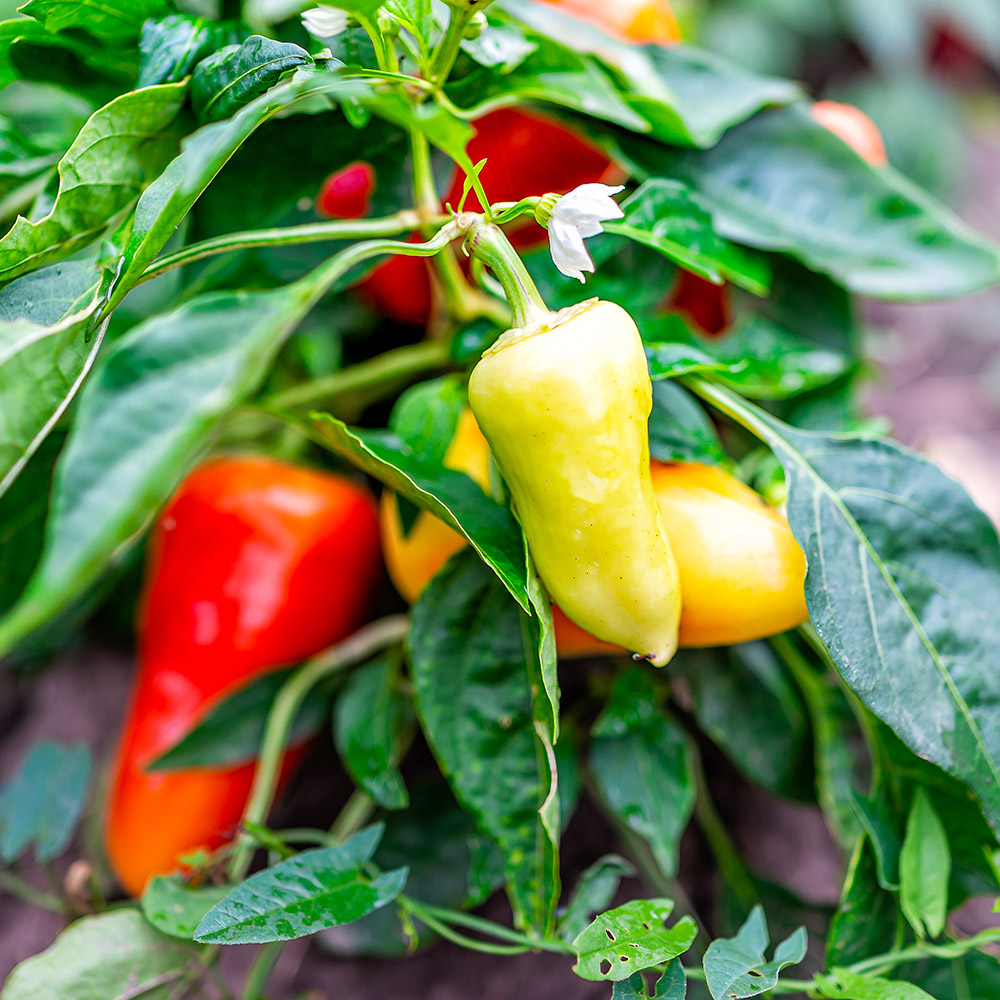The Ultimate Overview to Feeding Peppers: Enhancing Growth and Flavor Naturally
As pepper lovers seek to cultivate durable plants yielding savory fruits, the duty of fertilizing becomes paramount in attaining these goals. By discovering the advantages of all-natural fertilizers, opening the secrets behind pepper plant nutrient needs, and diving into the world of organic plant food options, a globe of possibilities emerges for boosting the vitality and flavor account of these beloved plants.
Advantages of All-natural Fertilizers
All-natural plant foods supply a range of benefits that add to the total wellness and productivity of pepper plants. By enriching the soil with natural issue, such as garden compost or manure, all-natural plant foods improve its water retention capacity and nutrient-holding abilities, producing a much more welcoming setting for pepper plants to grow in.
In addition, natural fertilizers support a diverse and energetic dirt microbiome, fostering useful microbial task that helps in nutrient recycling and uptake by the plants. This microbial activity can assist subdue hazardous microorganisms and conditions, decreasing the demand for chemical treatments. Furthermore, natural plant foods advertise lasting soil wellness by preserving a balanced environment underground, which subsequently sustains the general health and strength of pepper plants above ground.
Comprehending Pepper Plant Nutrient Needs
Having actually developed the benefits of organic fertilizers in enhancing dirt health and wellness and promoting microbial activity, the emphasis currently moves to understanding the details nutrient demands necessary for ideal growth and flavor in pepper plants.

Recognizing the particular nutrient needs of pepper plants is critical for attaining bountiful harvests with exceptional flavor. By providing the ideal equilibrium of nutrients via natural fertilizers or dirt amendments, cultivators can ensure healthy and balanced, energetic plants that generate tasty peppers throughout the expanding season.
Organic Plant Food Options for Peppers
In boosting the growth and taste of pepper plants, picking the suitable natural fertilizers is a vital consideration. Organic plant foods offer a all-natural and sustainable way to nurture pepper plants without presenting damaging chemicals to the dirt and environment. One prominent alternative is compost, which improves the soil with vital nutrients and boosts its framework, promoting healthy and balanced root development and general plant development. Additionally, garden compost helps maintain dampness in the dirt, decreasing water anxiety on pepper plants throughout heat.
Another effective natural plant food for peppers is aged manure. Rich in potassium, nitrogen, and phosphorus, aged manure provides a well balanced nutrient mix that sustains strenuous development and plentiful fruit manufacturing (best fertilizers for peppers). It is necessary to make use of well-aged manure to protect against melting the plants with excess ammonia
Fish solution is look at this website a fast-acting organic fertilizer that provides pepper plants with a fast increase of nutrients. Originated from fish waste, this fertilizer is high in nitrogen, making it particularly beneficial throughout the very early stages of pepper plant growth. Fish emulsion is very easy to use and is readily taken in by the plants, promoting healthy and balanced foliage and strong origin advancement.
When picking a natural fertilizer for peppers, consider the specific nutrient needs of your plants and select alternatives that line up with your gardening click to investigate techniques and values.
Best Practices for Feeding Pepper Plants
Taking into consideration the relevance of selecting proper natural fertilizers for pepper plants, applying finest techniques for fertilization is important to guarantee optimum growth and flavor advancement. Among the essential ideal methods for fertilizing pepper plants is to perform a dirt examination before using any plant foods. This examination will assist determine the particular nutrient demands of the soil and guide you in choosing the appropriate type and amount of fertilizer. It is additionally important to fertilize pepper plants at the ideal time, usually prior to growing and during crucial development phases such as flowering and fruit development.
An additional critical technique is to prevent over-fertilization, as this can bring about vitamins and mineral imbalances, stunted development, or also plant damages (best fertilizers for peppers). Complying with suggested dose directions and not exceeding them is important for the overall health and wellness of the pepper plants. Additionally, incorporating natural issue into the dirt with garden compost or mulching can aid other boost dirt framework, water retention, and nutrition accessibility, advertising much healthier pepper plants with improved taste accounts. By sticking to these best practices, you can successfully nourish your pepper plants and achieve plentiful harvests with premium preference and high quality.
Troubleshooting Common Fertilization Issues

pH imbalance is another issue that can affect nutrient uptake in pepper plants. Establishing a regular fertilizing timetable and adhering to suggested application prices can aid avoid this issue and make certain healthy pepper plants throughout the growing period.
Conclusion
In verdict, utilizing all-natural plant foods can substantially improve the growth and flavor of pepper plants. By recognizing the nutrient demands of pepper plants and selecting organic plant food alternatives, garden enthusiasts can properly promote healthy and strenuous growth. Following ideal methods for fertilizing pepper plants and repairing typical fertilization issues can aid make certain successful cultivation of peppers. On the whole, appropriate fertilization strategies are necessary for taking full advantage of the yield and top quality of pepper crops.
By discovering the benefits of all-natural fertilizers, unlocking the secrets behind pepper plant nutrient requires, and delving right into the world of organic fertilizer options, a world of opportunities arises for improving the vigor and flavor profile of these cherished plants.Fish solution is a fast-acting organic plant food that provides pepper plants with a quick increase of nutrients. It is also vital to feed pepper plants at the right time, commonly before planting and during vital development stages such as blooming and fruit development.
By understanding the nutrient needs of pepper plants and selecting organic fertilizer alternatives, gardeners can successfully promote healthy and balanced and energetic development. Complying with ideal practices for feeding pepper plants and fixing typical fertilization concerns can help guarantee successful farming of peppers.
 Taran Noah Smith Then & Now!
Taran Noah Smith Then & Now! Dylan and Cole Sprouse Then & Now!
Dylan and Cole Sprouse Then & Now! Bo Derek Then & Now!
Bo Derek Then & Now! Justine Bateman Then & Now!
Justine Bateman Then & Now! Nicki Minaj Then & Now!
Nicki Minaj Then & Now!